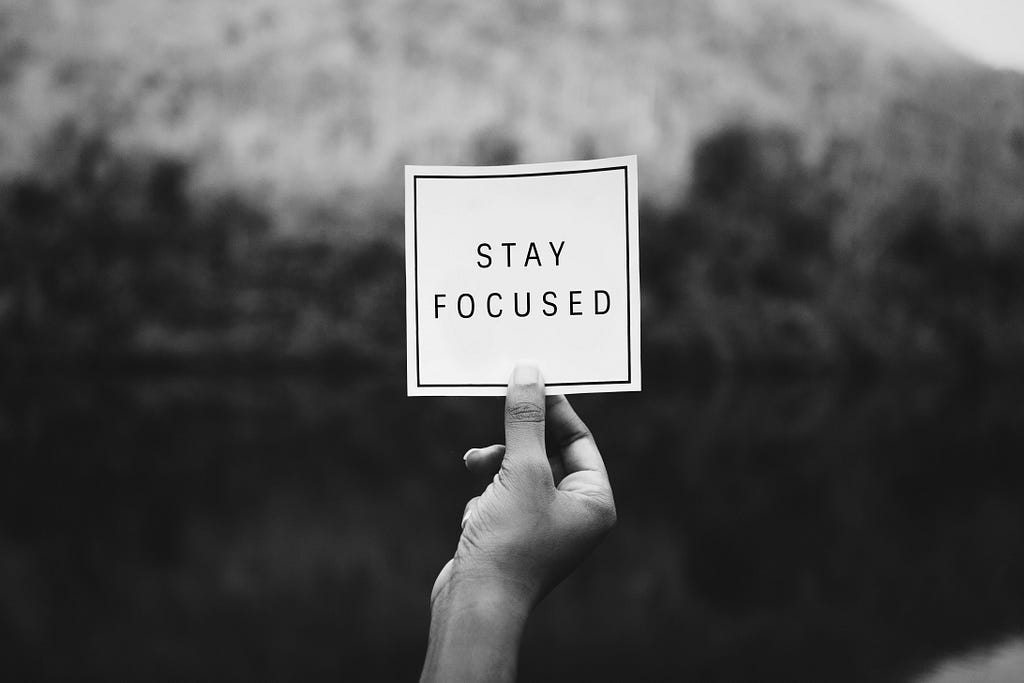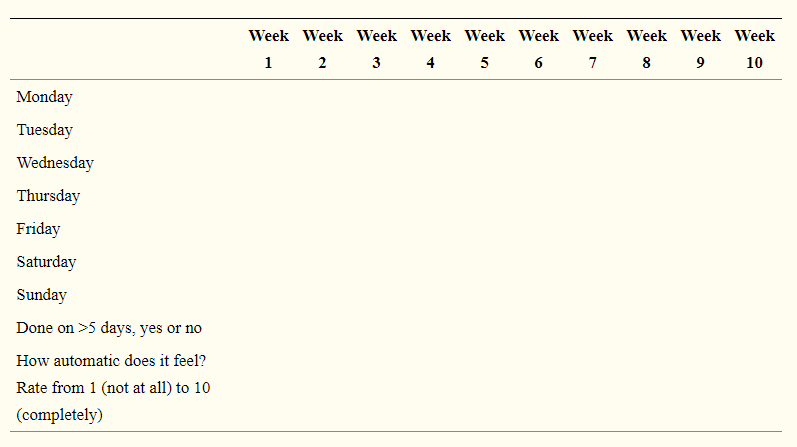Latest news about Bitcoin and all cryptocurrencies. Your daily crypto news habit.
 Photo by Eberhard on Pexels.
Photo by Eberhard on Pexels.
When I’m tired of studying in high-school, my family used to say, you will have enough time to do ‘…’ when you get into university.
And it happened, congratulations!
I had plenty of time to sleep, play video games, consume junk foods in the first year of university. At first, everything was fine. But when it turns into an addiction, my soul started to be sucked. Tiredness, boredom, under-eye bags, bad relations and many more.
Until the day I failed five of my exams and faced with the risk of extending the university. The severity of the situation finally dawned on me. I realized I’m late for exams, relations and life.
So how did I survive the hardship and become a data scientist?
Here are the method and the path I followed which brought me the achievement.
Self-Discipline
I do want to take a brief moment to define what exactly self-discipline is and where I want to start is by asking and answering two questions.
- Number one, ‘What exactly is self-discipline?’
- Number two, ‘How does it differ from motivation?’
Because I think a lot of people get these two terms confused. To start, I want to share a quote from the writer Samuel Thomas Davies. Because it actually answers both those questions in a pretty tidy way.
“Self-discipline is about leaning into resistance. Taking action in spite of how you feel. Living a life by design, not by default. But most importantly, it’s acting in accordance with your thoughts, not your feelings.”
Put another way, motivation is your overall level of desire to do something, whereas discipline is your ability to do it regardless of how you feel. And for any of you’ve ever woken up thinking, I don’t feel like it which is all of you, myself included, you can see now how important to self-discipline is. It’s building that baseline that allows you to act in accordance with your long-term goals, no matter how motivated you feel.
And I’m going to start with one that doesn’t seem very tangible or actionable at first. But stick with me here, because this is a mindset shift that I’ve found more helpful than any other self-improving technique I’ve tried in recent memory.
Focus on Identity
To put it simply, when you’re trying to change your behaviour, forget about the goal you’re trying to achieve, the external outcome, and instead focus on the change in identity you want to happen. This is a concept that I first read about in James Clear’s book, Atomic Habits which I highly recommend by the way. And there’s a passage near the beginning of the book that really encapsulates it well:
Imagine two people resisting a cigarette. When offered a smoke, the first person says,
‘No thanks, I’m trying to quit.’
It sounds like a reasonable response, but this person still believes they are a smoker who’s trying to be something else. They are hoping that their behaviour will change while carrying around the same beliefs. The second person declines by saying,
‘No thanks I’m not a smoker.’
It’s a small difference but the statements signal a shift in identity. Smoking was a part of their former life, not their current one. They no longer identify as someone who smokes.
So, the general idea here is that once you’ve embraced a change in your identity, you’re going to find yourself acting in alignment with that change. And if you’re wondering why exactly this happens, the third chapter of Robert Cialdini’s book Influence — The Psychology Of Persuasion, has a great explanation for it. Essentially, humans feel this natural compulsion to act consistently with their past decisions. As he writes in the book:
“Once we have made a choice or taken a stand, we will encounter personal and interpersonal pressures to behave consistently with that commitment. Those pressures will cause us to respond in ways that justify that justify our earlier decision”
Shifting my mindset in this way has been incredibly helpful in the past couple of months. And the first way that I implemented, it was by starting to think of myself as a writer. Now, I’ve always been a pretty curious person to write. But I have never thought myself as a writer. There were some imposter syndrome reasons for this. But, after reading that passage in the book, I decided to take the leap and start thinking myself as a writer, not just as somebody who writes proses. That shift in mindset has done wonders for my levels of self-discipline in many different areas from reading more consistently to writing harder, to even improving my diet, which has been a lot better than it used to be over the past couple of months. So, seriously, if you take nothing else from this article, I’m putting this first for a reason, start thinking about behaviour change in terms of the identity that you want to embody rather than the goals that you want to achieve.
 Photo by rawpixel on Pixebay.
Photo by rawpixel on Pixebay.
Create Reminders
Frequently remind yourself of why you’re being disciplined in the first place. At the end of the day, you have to have a strong why for actions if you want to do them consistently. And every time I think about this concept, I’m reminded of a story about the actor, Jim Carrey, and it goes like this,
After he arrived in Hollywood and he was still kind of an impoverished actor, one day he took out a napkin and he drew himself a check made out to himself for $10 million, and postdates for 5 years in the future. And then put that check in his wallet. So that every time he’d bring out his wallet, he could see it and remind himself of why he was working so hard, what he was working towards.
This is something that you might find very helpful to do as well. Try writing down your goal or the identity you want to assume and put it may be on a sticky note next to your desk or by your computer so you can see it every single day and know that this is why I’m building my self-discipline, this is the reason for all the work I’m putting in.
Embrace The Discomfort
Embracing the resistance you feel towards doing something that takes hard work with an unpleasant is an important concept. Just like going to an actual gym and lifting weights makes you better at lifting weights in the future and able to lift more weight the next time you go in. Every time you embraced discomfort you are essentially doing a rep of the exercise that is self-discipline because it is a skill that can be learned, it is a muscle that can be built over time.This is why some of the successful people proponent of taking cold showers because a cold shower is something that most people don’t want to do. It’s not very comfortable standing under that stream of ice cold water, and that’s the point.
Research suggests that hydrotherapy was widely used to improve immunity and for the management of pain, anxiety, anorectal disorders and many more.
Every morning that you get into the shower and you choose to turn that handle too cold instead of hot, you are embracing discomfort, you’re leaning into the resistance and that makes you better at doing so in the future regardless of what the task is. Don’t forget Ludwig Van Beethoven used to immerse his head in cold water to stay awake before he composes.
So, as you go through your daily life, find ways to embrace discomfort. It could be cold showers, it could be signing up for a fitness class, it could be taking the stairs instead of the elevator. Basically, whenever your brain throws up that I don’t feel like it an excuse, that is an opportunity to build that self-discipline, a muscle you should take it.
Target The Fundamentals
Item number four of our list which is to target the fundamentals first, and by the fundamentals I mean, biological necessities of life:
- Sleep
- Nutrition
- Exercise habits
These are all crucial to pay attention to. Because the part of your brain that handles executive functioning, the part that regulates your desires and you impulses, requires a lot of energy and regular rest to function at peak levels. Always remember that you are first and foremost a collection of biological systems, all of which you require the right inputs us if you want to get the best outputs out of them.
I know, it’s easy to picture the brain as separate from all of this, as existing in this metaphysical realm where the only needed fuel sources are motivation, determination and wholesome memes. But the brain needs rest, it needs exercise and it needs the right balance of nutrients just as the rest of your body does. So, if you are or you haven’t gotten enough exercise regularly or your diet is crap that is where you should focus your discipline first.
 Photo by Selover on Pexels
Photo by Selover on Pexels
Meditate
It pains me to say this one because I personally can’t concentrate well to do it but you may want to try meditation. The reason why you might want to do is that meditation has been shown scientifically to help people improve their levels of self-discipline.
In fact, a 2013 study at Stanford University showed that people who went through compassion training which has a specific meditation program were better able to regulate their emotions afterwards.
This is crucial for remaining disciplined and being able to make rational decisions. Now, an easy way to get started would be by using guided meditation which you can use through apps like Headspace and Calm or through many free videos on YouTube. But the form of meditation that I’ve always practised which I think is better for the development of self-discipline specifically is a form of what’s called zazen meditation where I simply sit and concentrate on my breath with my eyes closed. When my attention is inevitably by a random thought, I work to notice that and let that thought go and then bring my attention back to my breath. Doing this over the long-term has helped with self-discipline and concentration. As I said, I’m not a huge fan of meditation. it’s probably the self-development practice I do the least. But the benefits of doing so are undeniable.
Build Habits
Now like I said earlier, building new habits is kind of separate discipline in the overall pursuit of changing your behaviour. But, the initial stages of building a new habit often require self-discipline. Because the behaviour isn’t automatic yet. So, this could be a great way to, not only establish a new habit but also to become more disciplined in process. Whatever habits you choose to build, start small, track your progress, maybe use an app like Habitica or Strides or HabitBull on Android. Celebrate your wins and also remember to not focus too much on purity, on perfect streaks. Instead, focus on making sure that your trend is going on an overall positive direction. Remember that as is doing that and as that the behaviour is becoming more automatic, your self-disciple is improving in the process.
According to research, Habit-formation culminates in the ‘stability phase’, at which the habit has formed and its strength has plateaued so that it persists over time with minimal effort or deliberation.
And researchers recommend that you should have a simple tick sheet for self-monitoring performance like down below,
Make a new healhy habit:
1. Decide on a goal that you would like to achieve for your health.
2. Choose a simple action that will get you towards your goal which you can do on a daily basis.
3. Plan when and where you will do your chosen action. Be consistent: choose a time and place that you encounter every day of the week.
4. Every time you encounter that time and place, do the action.
5. It will get easier with time, and within 10 weeks you should find you are doing it automatically without even having to think about it.
6. Congratulations, you’ve made a healthy habit!
My goal (e.g. ‘to eat more fruit and vegetables’) _________________________________________________
My plan (e.g. ‘after I have lunch at home I will have a piece of fruit’)
(When and where) ___________________________ I will ___________________________
Some people find it helpful to keep a record while they are forming a new habit. This daily tick-sheet can be used until your new habit becomes automatic. You can rate how automatic it feels at the end of each week, to watch it getting easier.
Conclusion
I know, starting again is the hardest step after every failure. Because people need a strong trigger to enforce their own motivation. You should explore your motivation source to become a self-starter. Being a self-starter is the best way to overcome mishaps.
And the last word I can advise through my experiences while I was going on the path,
- Don’t spend too much time to think about the process. While implementing methods into your life, favour decent execution over perfect planning.
- Try to don’t share your goals with others. Because I heard a lot of times ‘you can’t do it’ even from most close friends when I shared my goals. It may disappoint. Instead, let them a surprise when you achieved!
Key To Success: Self-Discipline was originally published in Hacker Noon on Medium, where people are continuing the conversation by highlighting and responding to this story.
Disclaimer
The views and opinions expressed in this article are solely those of the authors and do not reflect the views of Bitcoin Insider. Every investment and trading move involves risk - this is especially true for cryptocurrencies given their volatility. We strongly advise our readers to conduct their own research when making a decision.
